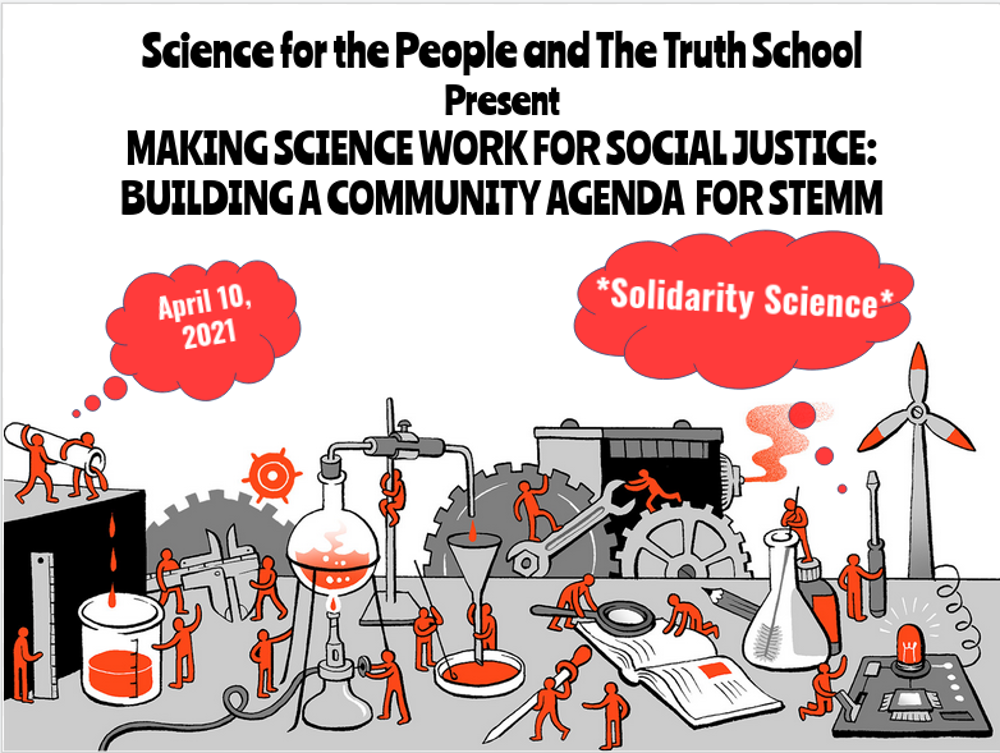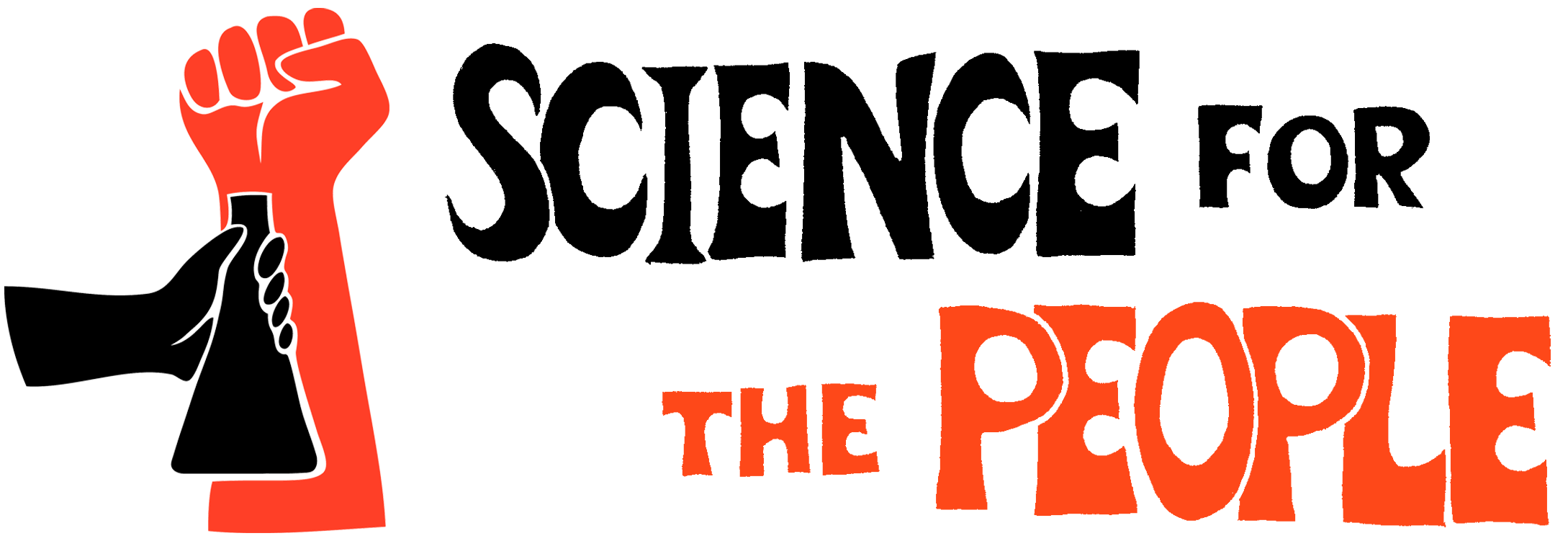
This was the third community workshop presented by Western Mass Science for the People through the Sojourner Truth School for Social Change Leadership. We delivered the workshop via Zoom on April 10th, 2021.
CLASS DESCRIPTION:
Following on our previous workshops, the Western Mass chapter of Science for the People brought scientists, students, and community organizers together in a further exploration of “solidarity science,” this time with a focus on building a community agenda for STEM.
WORKSHOP FACILITATORS AND PRESENTERS:
Rafael Burgos-Mirabal, Tatiana Cheeks, Defiance Science, Sean Donovan, Stephen Fernandez, Emma Harnisch, Tavar Jones, Deb Katz, Daniel Ko, Danielle Larrabee, Long River Medic Collective, Kimberly Medeiros, Adrienne Saums, Sigrid Schmalzer, Brian Schultz, Susan Theberge, Seth Tuler
SLIDES
These are the presentation slides from the workshop. Please feel free to adapt them for your own events, and if you do, please let us know — we’re excited to see what you do!
A COMMUNITY AGENDA FOR STEM
FINAL June 30, 2021
STEM has a history of white supremacy, patriarchy, and heteronormativity. Currently, this manifests itself in many ways: in the research topics that do (or do not) receive government and corporate funding, in the research that private institutions and academia as a whole support, and in the research that individuals choose (or feel able to choose) to pursue. Our aim is to work against these power structures to make STEM more inclusive of diverse communities and community-centered goals.
This Community Agenda for STEM emerged from a community workshop held over Zoom on April 10, 2021 by the Western Mass chapter of Science for the People. The workshop began with an introduction to the principle we call solidarity science, which holds that everyone possesses valuable knowledge based on their lived experiences, and that science will be more robust and better able to serve social justice when it fully involves a greater diversity of participants. We then heard perspectives on how science, technology, engineering, math, and medicine (STEM) can better serve social justice. Presenters included organizers involved in climate justice, harm reduction, environmental health, racial equity, community medical care, and radical science education. Participants were then invited to join breakout groups, where they built their own “community agenda for STEM,” based on the following questions:
- What problems do you see in your communities?
- What knowledge do you need to address these problems?
- How might scientists and engineers work in solidarity with you to create and share that knowledge?
- What kinds of activities that STEM workers do are detrimental to community interests?
- What barriers do you face to access the tools / knowledge that you need?
On the basis of the notes taken in the breakout rooms and subsequent discussion, SftP members collectively drafted the following list of expectations that together form a Community Agenda for STEM. We provided an opportunity for participants in the workshop to review a draft, and we finalized the Agenda on June 30, 2021.
Our goal is to push STEM professionals to step up and make serving social justice the core mission of their work. This means sharing resources, respecting community knowledge and self-determination, and committing to active solidarity with frontline communities.
We expect STEM professionals to:
SHARE
- Share knowledge with grassroots communities;
- Recognize that sharing knowledge requires effort to make that knowledge free, accessible, and relevant to specific communities by using appropriate language(s) and visualizations;
- Share institutional resources with grassroots communities;
- This may include: providing access to databases (no paywalls); identifying opportunities to direct available funding to organizations engaged in relevant work; including grassroots organizations in grant funding; advocating for community access to laboratory equipment and technical services, etc.
- Contribute skills and teach those skills to grassroots communities;
- Develop accessible methodologies and create DIY pathways to scientific techniques;
- Get involved in classrooms and youth programs where radical STEM education is happening.
RESPECT
- Recognize that community members have knowledge that is of equal value to that possessed by STEM professionals;
- Engage in collaborative knowledge production, including through community-based research;
- Properly compensate community members’ contributions;
- Engage in collective decision-making about the research;
- Adopt a holistic, human-centered approach to research;
- This includes: engaging beyond issues traditionally considered to be STEM; thinking beyond techno-fixes; meeting people where they’re at and listening authentically; addressing questions that people have, rather than just the ones STEM professionals want to answer;
- Involve community members and affirm community values and mindsets;
- Actively pursue behaviors, practices, and policies that reflect a spirit of solidarity, not charity;
- Identify and address exclusionary practices and policies in STEM institutions that prevent community members from participating;
- Value knowledge forms not traditionally viewed as STEM.
COMMIT
- Choose research topics that community organizers have identified as essential to social justice, including health equity and environmental justice;
- Advocate for government and philanthropic funding that supports research in the service of social justice, including health equity and environmental justice;
- Revise educational programs at every level to reflect a commitment to social justice;
- Reject the myth of neutrality and take political stands alongside frontline communities;
- Help expose the corporations, government entities, militaries, and other bad actors responsible for social, economic, health, and environmental injustices;
- Help expose how STEM itself is misused to support racism, sexism, classism, cisgender heteronormativity, environmental injustice, and other forms of oppression;
- Educate yourself on how your work and your institution perpetuates — and has the potential to subvert — imperialism, colonialism, racism, and capitalism;
- Be brave in exposing, analyzing, and challenging the institutional, social, political, and economic power dynamics that govern systems and situations;
- Join with other ‘solidarity scientists’ to create networks that support lasting change — for example by joining Science for the People and helping to build the Action Network.
